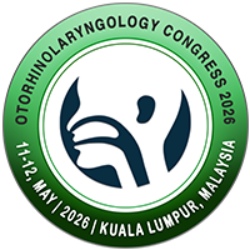Track: ENT Allergies & Immunotherapy

Session Overview:
This session aims to provide a comprehensive overview of ENT allergies and immunotherapy, focusing on the pathophysiology, diagnosis, and management of common allergic conditions affecting the ear, nose, and throat. Participants will gain insights into identifying allergic rhinitis, sinusitis, and other related disorders, with an emphasis on clinical evaluation, allergy testing, and evidence-based treatment approaches.
Recent Development:
Recent advancements in the understanding and management of ENT allergies and immunotherapy have significantly improved patient outcomes and expanded treatment options. Innovations in molecular allergy diagnostics, such as component-resolved diagnostics (CRD), now allow for more precise identification of allergen sensitivities, enabling personalized treatment plans. Biologic therapies, particularly monoclonal antibodies like omalizumab and dupilumab, have emerged as promising options for patients with severe or refractory allergic rhinitis and chronic rhinosinusitis with nasal polyps. Additionally, newer formulations and delivery methods for sublingual immunotherapy (SLIT) have enhanced patient compliance and safety.
Sub Tracks:
Allergic Rhinitis:
Allergic rhinitis is a common ENT condition caused by an allergic reaction affecting the nasal passages. Symptoms include sneezing, nasal congestion, runny nose, and itchy eyes. ENT specialists diagnose and manage allergic rhinitis through medical treatments, allergy testing, and sometimes immunotherapy to improve quality of life and prevent complications like sinus infections.
Sinusitis:
Sinusitis is the inflammation of the sinuses often caused by infection or allergies, leading to symptoms like facial pain, nasal congestion, and headache. ENT specialists diagnose sinusitis through clinical evaluation and imaging, and provide treatments ranging from medications to surgical interventions for chronic or severe cases.
Nasal Polyps:
Nasal polyps are soft, painless growths in the nasal passages or sinuses caused by chronic inflammation. They can lead to nasal blockage, reduced sense of smell, and recurrent infections. ENT specialists manage nasal polyps through medication or surgery to restore normal breathing and sinus function.
Postnasal Drip:
Postnasal drip occurs when excess mucus accumulates and drips down the back of the throat, causing irritation, coughing, and throat clearing. It’s commonly linked to allergies, sinus infections, or cold. ENT specialists diagnose the underlying cause and recommend treatments to relieve symptoms and prevent complications.
Subcutaneous Immunotherapy (SCIT):
Subcutaneous Immunotherapy is a treatment used in ENT to manage allergies by administering controlled allergen injections under the skin. This helps the body build tolerance over time, decreasing symptoms such as nasal stuffiness, sneezing, and throat irritation.
Scientific Highlights
- Anatomical and Physiological Disorders of ENT
- Lung Disease Airway Issues
- ENT Infections and allergies
- New treatment Advances in Otolaryngology
- Ear & Nose plastic surgery
- Endoscopic and laparoscopic ENT surgery
- Craniofacial & Facial surgery
- Otology and Neurotology
- ENT Microsurgery
- COVID 19 and ENT
- Pediatric Otolaryngology
- Speech and Swallowing Disorders
- Head and Neck Surgery
- Airway Management & Surgery
- ENT Allergies & Immunotherapy
- Surgical Techniques in ENT
- Nasal Polyposis and Biologic Therapy
- Advances in Cochlear Implants
- Recent Advances in Otorhinolaryngology
- Vertigo and Balance Disorders


